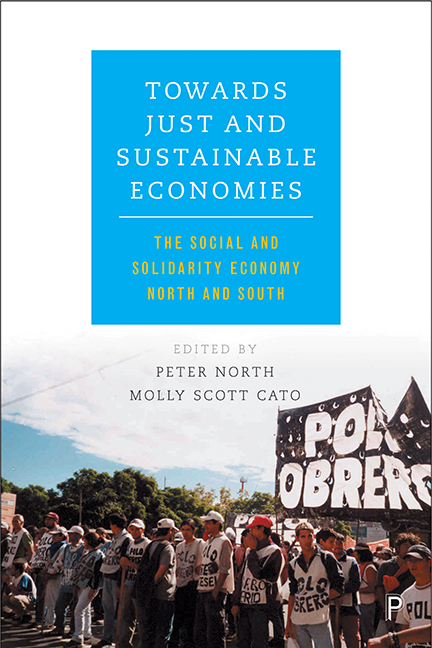Book contents
- Frontmatter
- Dedication
- Contents
- List of figures and tables
- Notes on contributors
- Acknowledgements
- One Introduction: new economies North and South – sharing the transition to a just and sustainable future
- Part I Theoretical perspectives on the social and solidarity economy
- Part II The social and solidarity economy as a site of social innovation
- Part III The social and solidarity economy and the state
- Part IV Policy translation between North and South
- Index
Ten - The Danish low carbon transition and the prospects for the democratic economy
Published online by Cambridge University Press: 05 April 2022
- Frontmatter
- Dedication
- Contents
- List of figures and tables
- Notes on contributors
- Acknowledgements
- One Introduction: new economies North and South – sharing the transition to a just and sustainable future
- Part I Theoretical perspectives on the social and solidarity economy
- Part II The social and solidarity economy as a site of social innovation
- Part III The social and solidarity economy and the state
- Part IV Policy translation between North and South
- Index
Summary
Introduction
In the last quarter of the 20th century, Denmark underwent a remarkable transformation in its energy system, moving from almost complete dependence on imported oil for most of its energy needs to becoming a beacon for climate change amelioration and a renewable energy role model. Lacking the vast hydro-electric resources of its Nordic neighbours, the country's success in building up a renewable energy capacity has been all the more remarkable. Key to this success has been the emergence of a wind power sector that has created 20,000 jobs and at one point in the early 2000s accounted for 50% of the world market for wind turbine manufacture (DEA, 2007).
Although it has rightly gained plaudits internationally for its leadership in tackling global warming (for example, IEA, 2006), rather less has been said about the social and political foundations of Denmark's low carbon transition. Perhaps this is because the latter has been founded on a very different set of social and political relations to the dominant global neoliberal model of energy governance and regulation. Rather than imposing the kinds of market discipline and private ownership on the sector apparent elsewhere, the Danish low carbon transition has been characterised by a more democratic and social model of economic development, combining high-level state support and institutional mechanisms on the one hand with bottom-up forms of mobilisation, collectivisation and ownership on the other. In short, it contains strong aspects of democratic engagement and social empowerment commensurate with Erik Olin Wright's call for actually existing alternatives to global neoliberalism (Wright, 2010). As such, it offers some interesting pointers towards more solidaristic forms of economic action and practice that are the focus of this book.
This chapter argues that the ‘Danish model’ evident here is associated with the high watermark of the Nordic variant of social democracy under capitalism with a high level of non-commodified social relations (Esping Anderson, 1990). While not an alternative to capitalism per se, it does offer elements of an alternative configuration of economic and social relations capable of moving away from a capitalist value ethos of individual profit maximisation towards one of social need, the common good and solidaristic values. But it also demonstrates some of the tensions and constraints in sustaining a socialised economic model in a broader landscape of continuing neoliberal encroachment.
- Type
- Chapter
- Information
- Towards Just and Sustainable EconomiesThe Social and Solidarity Economy North and South, pp. 179 - 194Publisher: Bristol University PressPrint publication year: 2017



